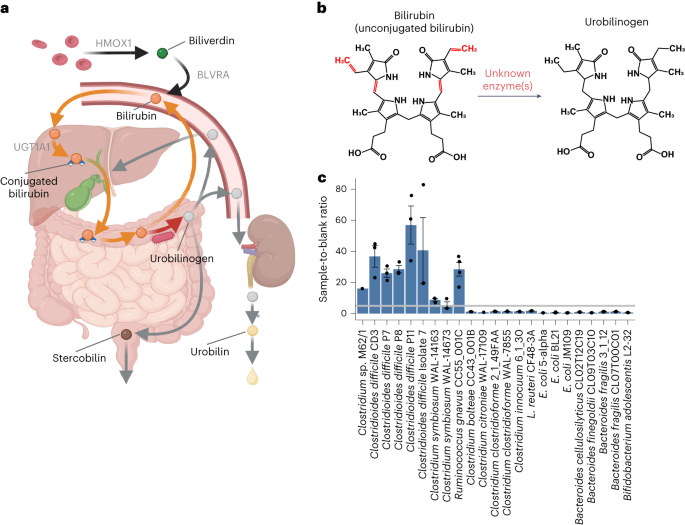💡This study unveils the long-standing mystery of the enzyme responsible for the reduction of bilirubin to urobilinogen in the human gut. Through a combination of biochemical analyses, comparative genomics, and metagenomic studies, they identified and characterized Bilirubin Reductase (BilR) as the key bacterial enzyme involved in this crucial step of the haem degradation pathway. The findings shed light on the role of the gut microbiome in bilirubin metabolism and underscore the significance of the gut–liver axis in maintaining bilirubin homeostasis.
📍 Prevalence of BilR in Gut Microbiomes: BilR is predominantly encoded by Firmicutes species, and its prevalence was nearly ubiquitous in the gut microbiomes of healthy adults. A decreased prevalence of BilR was observed in neonates and individuals with inflammatory bowel disease (IBD), suggesting its potential role in maintaining bilirubin homeostasis.
📍 Implications for Health and Disease: Dysregulation of gut microbial bilirubin reduction can affect serum bilirubin levels, leading to health implications such as jaundice and neurological damage. The study highlights the importance of BilR in the gut–liver axis and its role in determining the balance of multiple health-relevant metabolites.
📍 Association with Neonatal Jaundice: The absence or low abundance of bilirubin-reducing microorganisms, including those encoding BilR, in the gut of young infants supports the hypothesis that neonatal jaundice may be exacerbated by this deficiency.
📍 Insights into Inflammatory Bowel Disease: The lowered prevalence of BilR in patients with IBD suggests a potential disruption of bilirubin metabolism in these individuals. The study raises hypotheses about the correlation between disrupted bilirubin metabolism and the increased incidence of calcium bilirubinate gallstones observed in IBD patients.
The study supports the hypothesis that a single enzyme, BilR, performs the reduction of bilirubin to urobilinogen. The prevalence of BilR in healthy adults, coupled with its decreased presence in neonates and IBD patients, suggests its essential role in maintaining bilirubin homeostasis. The study highlights the potential disruption of bilirubin metabolism in IBD and its correlation with other health-relevant metabolites.
Link to the article: http://tinyurl.com/y4rf84y8
